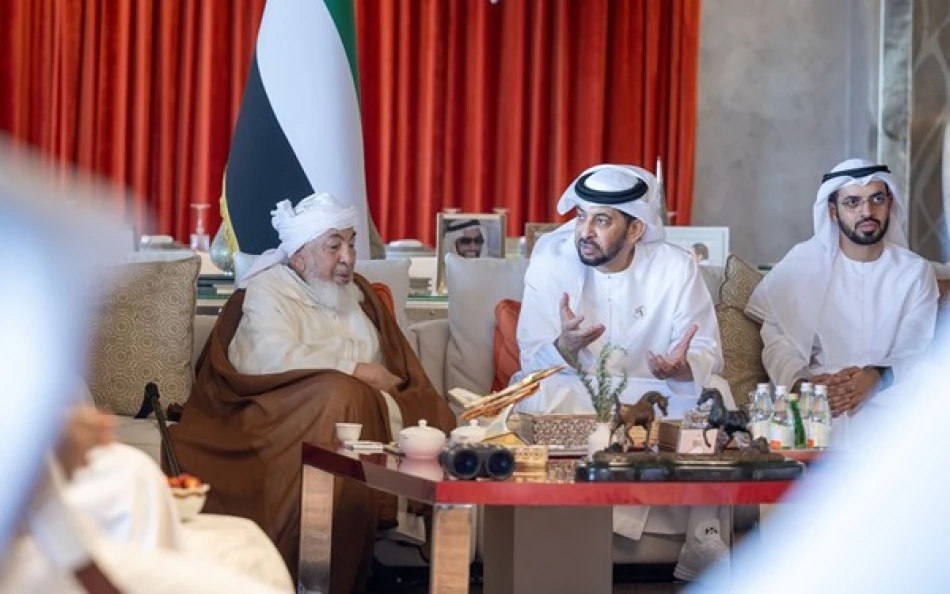
UAE's Hamdan Bin Zayed Meets Delegation from Emirates Council for Fatwa
UAE and Morocco Deepen Religious Cooperation Through Joint Islamic Scholarship Initiative
The UAE is strengthening its position as a regional hub for moderate Islamic scholarship through expanded cooperation with Morocco, as senior Emirati officials met with the UAE Council for Islamic Jurisprudence in Rabat to advance joint religious education and fatwa coordination. This collaboration reflects both nations' strategic emphasis on countering religious extremism while modernizing Islamic jurisprudence for contemporary challenges.
High-Level Diplomatic Engagement Signals Strategic Priority
Sheikh Hamdan bin Zayed Al Nahyan, the Ruler's Representative in Al Dhafra Region, received a delegation from the UAE Council for Islamic Jurisprudence in Morocco's capital, led by Sheikh Abdullah bin Bayyah, the council's chairman. The meeting underscores how the UAE leadership views religious soft power as integral to its broader diplomatic and domestic stability strategies.
The delegation included Dr. Omar Habtoor Al Darei, the council's deputy chairman, alongside Islamic studies experts and jurisprudence specialists, indicating the technical depth of this cooperation beyond ceremonial exchanges.
New Educational Initiative Targets Humanitarian Leadership
A key focus of the discussions centered on the "Hamdan bin Zayed Diploma for Sustainable Humanitarian Work," presented by Dr. Khalifa Mubarak Al Dhaheri, Director of Mohammed bin Zayed University for Humanities. This program aims to develop specialized professionals capable of creating measurable humanitarian impact in philanthropy and development sectors.
This educational initiative aligns with the UAE's broader strategy of institutionalizing its humanitarian influence globally, similar to how other Gulf states have leveraged educational programs to extend cultural and religious influence.
Bilateral Workshop Addresses Modern Jurisprudence Challenges
The visit coincided with a scientific workshop organized jointly by the UAE Council for Islamic Jurisprudence and Morocco's Supreme Scientific Council for Islamic Affairs. The workshop focused on regulations and policies governing public and private religious rulings (fatwas), addressing a critical need for standardized approaches to contemporary Islamic jurisprudence.
This collaboration tackles a significant challenge facing Muslim-majority nations: how to provide authoritative religious guidance on modern issues ranging from financial technology to medical ethics, while preventing the proliferation of unauthorized or extremist interpretations.
Strategic Context: Moderate Islam as State Policy
The initiative reflects President Sheikh Mohammed bin Zayed Al Nahyan's vision of promoting moderate Islamic thought and tolerance. This approach serves multiple strategic objectives: countering extremist ideologies, enhancing the UAE's religious legitimacy, and creating frameworks for addressing contemporary challenges through Islamic scholarship.
Both the UAE and Morocco have positioned themselves as champions of moderate Islam, competing with Saudi Arabia's traditional religious authority while offering alternative models that emphasize tolerance and coexistence with other faiths and cultures.
Document Exchange Highlights Practical Cooperation
The meeting concluded with the presentation of the "Abu Dhabi Document on Islamic Accommodation of Scientific Developments" to Sheikh Hamdan, along with proceedings from a conference titled "Towards Islamic Accommodation of Scientific Developments." These documents represent practical efforts to bridge traditional Islamic scholarship with modern scientific and technological realities.
This type of scholarly cooperation between the UAE and Morocco signals a broader trend among moderate Muslim nations seeking to reclaim religious discourse from extremist groups while maintaining relevance in rapidly changing societies. The success of such initiatives could influence how other Muslim-majority countries approach the intersection of religious authority, education, and international cooperation.
Most Viewed News

 Layla Al Mansoori
Layla Al Mansoori






